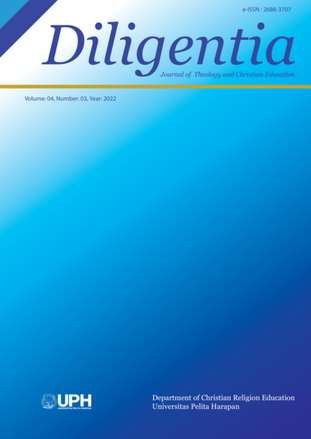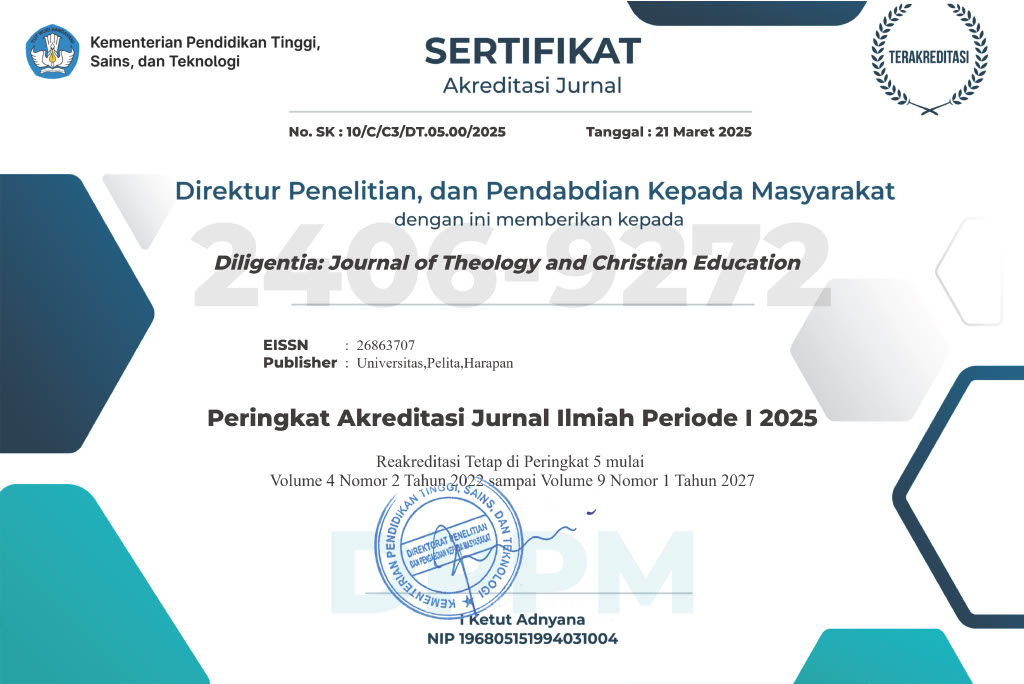Kesetiaan dalam Pernikahan sebagai Karakteristik Seorang Pemimpin Kristen [Fidelity in Marriage as a Characteristic of a Christian Leader]
DOI:
https://doi.org/10.19166/dil.v4i3.6382Keywords:
Pemimpin kristen, kesetiaan, pernikahan, Christian leadership, faithfulness, marriageAbstract
Being the husband of a wife is one of the requirements set by Paul for an church overseer. However, there are various interpretations of Paul's words written in 1 Timothy 3:2a. The purpose of this article is to dig deeper into what Paul meant when he set out this requirement and how it relates to Christian leadership. For Paul, a Christian leader must be someone who has good credibility, namely as a husband who is faithful to his wife in a monogamous marriage. This is a manifestation of his faithfulness to God Himself. By having this qualification, a Christian leader can be a good example to his congregation.
BAHASA INDONESIA ABSTRACT: Suami dari satu isteri merupakan salah satu persyaratan yang ditetapkan oleh Paulus bagi seorang penilik jemaat. Namun demikian, terdapat berbagai macam interpretasi atas perkataan Paulus yang tertulis didalam 1 Timotius 3:2a. Tujuan artikel ini adalah untuk menggali lebih dalam apa yang Paulus maksudkan ketika ia menetapkan persyaratan tersebut dan bagaimana relevansinya terhadap kepemimpinan Kristen. Bagi Paulus, seorang pemimpin Kristen haruslah seseorang yang memiliki kredibilitas yang baik, yaitu sebagai suami yang setia kepada istrinya dalam pernikahan monogami. Hal ini sebagai perwujudan dari kesetiaannya kepada Allah sendiri. Dengan memiliki kualifikasi tersebut, seorang pemimpin Kristen dapat menjadi teladan yang baik bagi jemaatnya.
References
Berkouwer, G. C. Studies in Dogmatics: Man, the Image of God. Grand Rapids, MI: Eerdmans, 1962.
Grudem, Wayne A. Systematic Theology: An Introduction to Biblical Doctrine. Grand Rapids, MI: Zondervan, 1994.
Issler, Klaus D. "Inner Core Belief Formation, Spiritual Practices, and The Willing Doing Gap." Journal of Spiritual Formation & Soul Care 2, no. 2 (2009): 179-198. https://doi.org/10.1177/193979090900200203" rel="noreferrer noopener" target="_blank">https://doi.org/10.1177/193979090900200203.
Issler, Klaus D. "Five Key Barriers to Deep Learning and Character Formation Based Primarily on Jesus Parable of The Four Soils." Christian Education Journal 3, no. 9 (2012): 138-156. https://www.proquest.com/openview/ba65149157530add243720976f5df9fc/1?pq-origsite=gscholar&cbl=38112" rel="noreferrer noopener" target="_blank">https://www.proquest.com/openview/ba65149157530add243720976f5df9fc/1?pq-origsite=gscholar&cbl=38112.
Knight III, George W. The Pastoral Epistles: A Commentary on the Greek Text. Grand Rapids, MI: Eerdmans, 1999.
Liefeld, Walter L. 1 and 2 Timothy, Titus: The NIV Application Commentary from Biblical Text--to Contemporary Life. Grand Rapids, MI: Zondervan, 1999.
Mounce, William D. Pastoral Epistles. Grand Rapids, MI: Zondervan, 2000.
Quinn, Jerome D., and William C. Wacker. The First and Second Letters to Timothy: Critical Eerdmans Commentary. Grand Rapids, MI: Eerdmans, 2000. https://doi.org/10.5040/bci-001b" rel="noreferrer noopener" target="_blank">https://doi.org/10.5040/bci-001b.
Stassen, Glen Harold, and David P. Gushee. Kingdom Ethics: Following Jesus in Contemporary Context. Downers Grove, IL: InterVarsity Press, 2003.
Towner, Philip H. The Letters to Timothy and Titus. Grand Rapids, MI: Eerdmans, 2006.
Downloads
Published
How to Cite
Issue
Section
License
Authors who publish with this journal agree to the following terms:
1) Authors retain copyright and grant the journal right of first publication with the work simultaneously licensed under a Creative Commons Attribution License (CC-BY-SA 4.0) that allows others to share the work with an acknowledgement of the work's authorship and initial publication in this journal.
2) Authors are able to enter into separate, additional contractual arrangements for the non-exclusive distribution of the journal's published version of the work (e.g., post it to an institutional repository or publish it in a book), with an acknowledgement of its initial publication in this journal.
3) Authors are permitted and encouraged to post their work online (e.g., in institutional repositories or on their website). The final published PDF should be used and bibliographic details that credit the publication in this journal should be included














